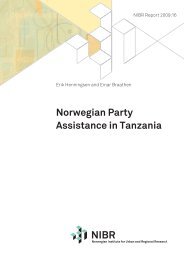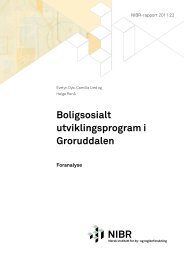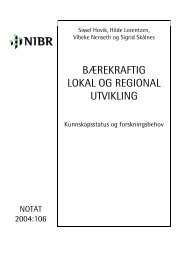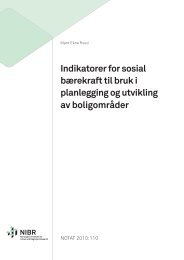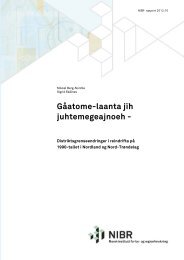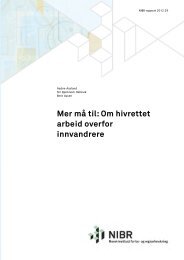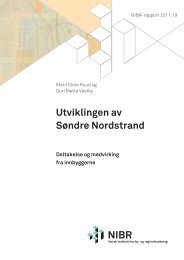http://www.tandfonline.com/page/terms-andconditions
The special importance of housing policy for ethnic minorities ...
The special importance of housing policy for ethnic minorities ...
- No tags were found...
Create successful ePaper yourself
Turn your PDF publications into a flip-book with our unique Google optimized e-Paper software.
2 H. Skifter Andersen et al.Downloaded by [Norsk Institutt for By og] at 07:07 11 March 2013the last 25 years, which has changed the <strong>com</strong>position of the population. All the countrieshave developed policies for integration of new residents alongside and interwoven withtheir universal welfare policies. Despite universal welfare policies, the majority of theimmigrants in all four countries find themselves in different housing positions from theethnic majority population. But immigrants’ housing position differs a great deal betweenthe countries, both in absolute <strong>terms</strong> and <strong>com</strong>pared with that of the native population.The purpose of this article is to examine the reasons why immigrants’ housing positiondiffers so much between four countries that are in many ways quite alike, and what can belearned from this about the effects of housing policy on immigrants’ housing options.Differences between different countries concerning immigrants’ housing conditionscan partly be a result of general differences in housing supply. We want to adjust for thesedifferences by <strong>com</strong>paring immigrants’ housing situation with that of the whole populationin the four Nordic countries, as described in the methodological section below. Our objectis to identify separate elements of housing policy that are of major importance in explainingwhy immigrants’ housing options differ from that of the native population.The article is structured as follows. It begins with a general discussion and literaturereview on determinants of housing preferences, options and choices of immigrants. Thenthere is a methodological and research design section. The <strong>com</strong>parison of the four Nordiccountries starts with a description of immigration to the countries, followed by a <strong>com</strong>parisonof housing policies and housing markets. Next, housing affordability in the countries isevaluated and the housing inequality between in<strong>com</strong>e groups is clarified. The housingoptions for immigrants are examined by making an assessment of immigrants’ access todifferent tenures and by an analysis of differences in the housing situation among theimmigrant population <strong>com</strong>pared with those of the whole population, measured by tenureprofile and overcrowding. In the last section, we analyse to what extent divergence inhousing policies can explain the different positions of immigrants on the housing markets.We draw conclusions regarding the particular importance of different elements of housingpolicy for the housing situation of the immigrant population.Literature on the determinants of immigrants’ housing choices and optionsIn European countries, housing preferences and housing choices of ethnic minorities canto a great extent be expected to have the same reasons as those of other citizens. Thatis, they depend on family situation, economic resources and local housing market possibilities.Unlike the native population, immigrants’ housing preferences also depend onexpectations concerning staying in the country or returning to where they came from, andtransnational relations. Regardless of reasons, evidence shows that the housing situationof ethnic minorities in most countries diverges much from that of the native population(see, for example, Musterd, 2005; Johnston, Forrest, & Poulsen, 2002; Finney, 2002; Blom& Henriksen, 2008; Fong & Chan, 2010). These differences cannot be fully explained bylower in<strong>com</strong>es among immigrants.Some studies explain the housing situation of ethnic minorities primarily via theirlack of resources. As well as economic resources, cognitive, political and social resourcesare important (Van Kempen, 2003). It is particularly these non-economic resources thatnewly arrived ethnic minorities often lack. In parts of the housing market, good contactsto persons or institutions are decisive for access to dwellings. This especially concernsprivate landlords. It is important to have relevant knowledge of the possibilities and ruleson the housing market, which also often requires good language skills or good access toadvisers. Exacerbating the disadvantage of low in<strong>com</strong>es, immigrants can thus also have



